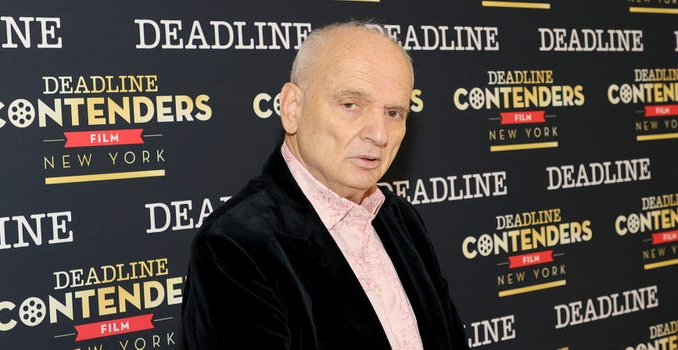
Introduction: A Bold Vision for Television
When The Sopranos premiered on HBO in 1999, it revolutionized TV. But the mastermind behind this groundbreaking show, David Chase, was met with resistance from network executives who didn’t fully understand his vision. One of the more surprising demands came early on: they told him to “dumb it down.”
At the time, television was dominated by simpler, more conventional narratives, and The Sopranos—with its complex characters, deep psychological exploration, and non-linear storytelling—was anything but conventional. But David Chase refused to simplify his artistic vision. His decision would not only help define The Sopranos but also pave the way for what would become known as the “Golden Age of Television.”

Let’s explore why Chase was adamant about keeping The Sopranos true to his vision and how this bold choice helped shape the future of television.
1. The Request to “Dumb It Down”
Who Made the Request?
David Chase, the creator of The Sopranos, was no stranger to challenges when he pitched the show to HBO. While the network was known for pushing boundaries, it had never aired a series quite like The Sopranos. The executives at HBO saw the potential for a mafia series with unique storytelling elements, but they also feared it might be too complex for general audiences. That’s when the infamous request came in: “Dumb it down.”
The network was concerned about how the audience would react to the deep psychological elements of Tony Soprano’s character and the often unconventional, slow-paced narrative. Shows like The X-Files and Friends were dominating the airwaves, and the formulaic approach to storytelling was a safe bet for advertisers. In contrast, Chase’s vision was a far cry from the typical TV fare at the time.
What Did “Dumbing It Down” Mean?
To “dumb it down” meant simplifying the plot and characters, making them more accessible and less ambiguous. They wanted less of the intricate psychological elements, fewer introspective scenes, and a more straightforward storyline that audiences could easily follow. But David Chase had a different approach in mind—one that would change television forever.
2. David Chase’s Defiance: Staying True to His Vision
Why Chase Refused to ‘Dumb It Down’
David Chase wasn’t interested in making The Sopranos a cookie-cutter mafia drama. Instead, he wanted to create a show that reflected the complexity of human nature, exploring themes of morality, identity, and mental health within the context of the mob world. If the network executives wanted a more conventional mob story, they were asking for something that wasn’t part of his vision.
Chase believed that simplifying the show would diminish its authenticity and emotional depth. The Sopranos wasn’t just about mafia life; it was about Tony Soprano’s struggles with depression, anxiety, and his complicated relationships with family and friends. By dumbing it down, Chase feared the show would lose its unique voice and fail to resonate with audiences in a meaningful way.
The Artistic Integrity of The Sopranos
Chase’s refusal to follow mainstream TV conventions was about more than just artistic pride; it was about respect for the audience. He wanted to make a show that would challenge viewers, not one that catered to a lowest common denominator. In many ways, this decision was about elevating television to an art form, where complexity, ambiguity, and moral grey areas could be explored without fear of alienating audiences.
This level of commitment to storytelling and character depth would ultimately set The Sopranos apart from everything else on TV.
3. The Role of Complex Characters
Tony Soprano: A Mob Boss with Emotional Depth
Tony Soprano was not your typical mafia boss. He was a deeply flawed, multifaceted character who struggled with depression, anxiety, and an overwhelming sense of guilt. Throughout the series, we watched Tony navigate the challenges of leading a crime family while trying to maintain a semblance of normalcy in his personal life. His therapy sessions with Dr. Melfi—where he explored his mental health issues—became one of the show’s most iconic and complex plot points.
Had Chase listened to the network’s demand to simplify the show, Tony’s internal struggles might have been minimized or ignored. But by keeping those complexities intact, Chase ensured that The Sopranos wasn’t just a show about mobsters; it was about real human experiences.
Supporting Characters Who Defy Stereotypes
It wasn’t just Tony who received this level of depth. Characters like Carmela, Christopher, Paulie, and even Dr. Melfi were given rich backstories and complicated motivations that elevated the show’s narrative. These weren’t one-dimensional mob characters. They were people with desires, flaws, and vulnerabilities. For instance, Carmela’s struggles with her complicity in Tony’s crimes and her own aspirations were explored in ways that went far beyond typical mafia wife tropes.
4. Psychological Complexity and Themes of Mental Health
Breaking the Silence on Mental Health
One of the most striking aspects of The Sopranos was its willingness to explore psychological issues like depression, anxiety, and the human psyche in depth. Tony’s therapy sessions with Dr. Melfi were groundbreaking for a TV series, showing that even the toughest mob bosses could struggle with their mental health. These moments were rarely seen in television at the time and were far from “dumbed down.”
Chase’s decision to delve into these themes gave the show an intellectual and emotional weight that other mafia shows couldn’t match. It also allowed the audience to relate to Tony on a more personal level, understanding his flaws and vulnerabilities, and thus deepening the emotional impact of the show.
5. The Legacy of The Sopranos‘ Complexity
How The Sopranos Influenced Future TV Shows
Chase’s refusal to simplify The Sopranos paved the way for a new era of television. The series proved that audiences were ready for more than just entertainment—they wanted stories that made them think, characters who were more than just their actions, and plots that didn’t always tie up neatly at the end of an episode.
Shows like Breaking Bad, Mad Men, and The Wire followed in The Sopranos‘ footsteps, embracing complex narratives, antiheroes, and the psychological depth that Chase had introduced. These shows, often referred to as part of the “Golden Age of Television,” owe a great deal to The Sopranos and the groundbreaking storytelling that David Chase championed.
6. The Cultural Impact of The Sopranos
Why The Sopranos Is Still Relevant Today
Even more than 20 years after its debut, The Sopranos continues to be relevant in discussions about TV’s evolution. Its exploration of complex characters, moral ambiguity, and the emotional landscape of its protagonists created a template for modern television that is still widely followed today.
David Chase’s decision to resist the push to “dumb it down” created a series that not only stood the test of time but also changed the way we view TV as a medium for serious, complex storytelling.
Conclusion: A Vision that Transformed TV
David Chase’s choice to reject the advice to “dumb it down” wasn’t just about refusing to compromise; it was about respecting the intelligence of the audience and trusting that they were ready for a show with emotional depth, moral complexity, and an unpredictable narrative. By staying true to his artistic vision, Chase transformed The Sopranos into something much bigger than a mafia drama. It became a cornerstone of modern television, forever changing what we expect from TV series.
The refusal to simplify the show not only preserved its integrity but also paved the way for a new kind of television—one that could be as intellectually challenging and artistically ambitious as any film. And in doing so, The Sopranos will forever remain one of the greatest TV shows of all time.
5 Unique FAQs About The Sopranos and David Chase
1. What made The Sopranos so groundbreaking compared to other TV shows?
The show’s complexity, especially in character development and exploration of psychological themes, set it apart from traditional television dramas at the time.
2. Did HBO really ask David Chase to simplify The Sopranos?
Yes, early in the process, HBO executives urged David Chase to “dumb down” the show to make it more accessible to a wider audience, but he refused, believing that simplifying it would compromise its integrity.
3. How did David Chase’s refusal to simplify the show affect its success?
By staying true to his artistic vision, Chase created a show that was both intellectually challenging and emotionally engaging, which helped it resonate deeply with viewers